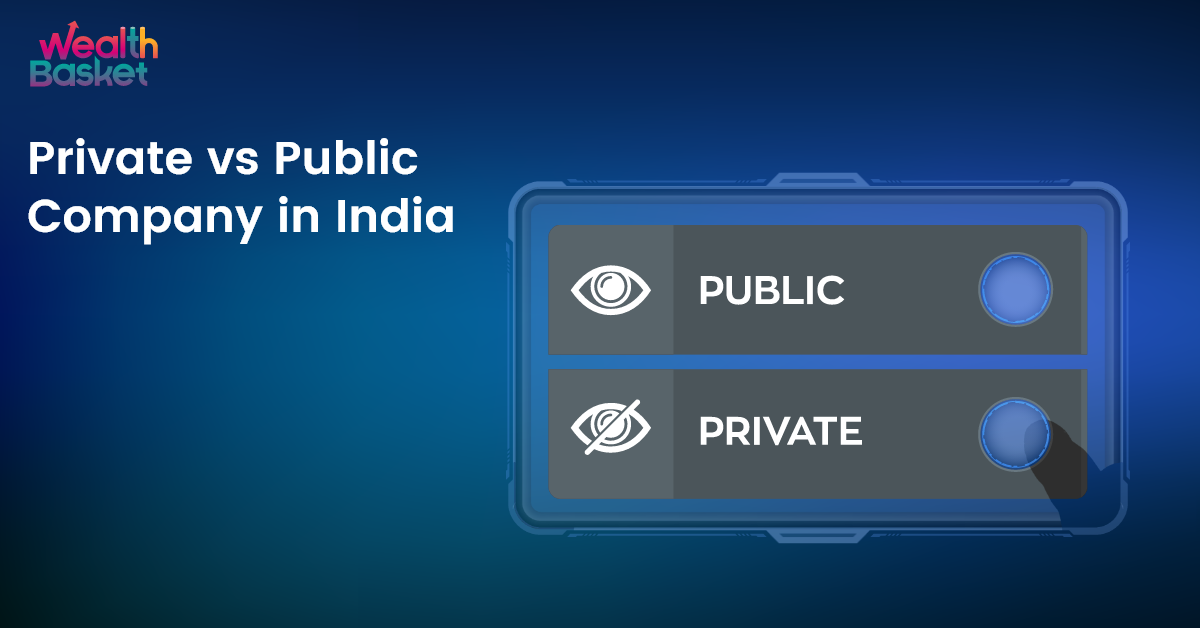Companies in India can be categorised on various bases, such as liability of members, ownership and control, mode of incorporation, number of members and transferability of shares, etc. Based on the number of members and transferability of shares, the companies can be categorised as private limited and public limited.
This article talks about the meaning of a company, what a private company is, its advantages and disadvantages, what a public company is, its advantages and disadvantages, and public limited vs private limited companies.
What Is A Company?
As per the Companies Act, 2013, a company means any organisation incorporated under this or any previous company law.
A company is a legal entity created to carry out a business by a group of people who work towards achieving common objectives.
What Is A Private Company?
As per the Companies Act, 2013 [Section 2(68)], a private company is a company having a minimum paid-up share capital of ₹1,00,000 and which, by its articles,
(i) restricts the right to transfer its shares;
(ii) except in the case of One Person Company, limits the number of its members to two hundred,
(iii) prohibits any invitation to the public to subscribe to any securities of the company.
However, it is a technical definition. Simply put, a private company does not allow the general public to subscribe to its shares or any other securities; instead, it raises the required funds from fewer investors. Its shares are not freely transferrable.
Private companies have ‘Private Limited’ as a suffix in their names. A few examples of private limited companies in India are Paypal Payments Private Limited, PhonePe Private Limited, Bundl Technologies Private Limited (Swiggy), etc.
Private Company: Advantages And Disadvantages
| Advantages | Disadvantages |
| Limited liability of members | Restrictions on transfer of shares |
| Lesser regulatory requirements | Can’t invite the general public to subscribe to its securities |
| Relatively easier decision making | Difficult to raise a large amount of funds |
What Is A Public Company?
As per the Companies Act, 2013 [Section 2(71)], a public company
(i) is not a private company;
(ii) has a minimum paid-up share capital of ₹5,00,000
Simply put, a public company is a company that allows the transfer of shares and allows the public to subscribe to any securities it issues.
Public companies have ‘Limited’ as a suffix in their names. Some examples of public limited companies in India are Reliance Industries Limited (RIL), Bharat Heavy Electricals Limited (BHEL), Infosys Limited, etc.
Public Company: Advantages And Disadvantages
| Advantages | Disadvantages |
| Ability to raise a significant amount of capital | More strict regulatory requirements |
| Better opportunities for growth | Ownership and control spread among a massive number of shareholders |
| Popularity in the market | – |
| Easy transferability of shares | – |
Differences Between Private And Public Companies
Here are the differences between private and public companies in table form.
| Point of difference | Private Company | Public Company |
| Raising funds | It can raise funds from a limited number of investors. | It can raise funds from the general public by issuing securities to them. |
| Minimum paid-up capital | ₹1 lakh | ₹5 lakh |
| Minimum and maximum number of members | Minimum – two members maximum – two hundred members | Minimum – seven members maximum – no such limitations |
| Minimum number of directors | At least two directors | At least three directors |
| Transfer of shares | Shares are not freely transferable. | Shares are freely transferable and tradable through the stock exchange. |
| Valuation | Arriving at the valuation is relatively difficult. | Arriving at the valuation is easier as its financial statements are published. |
| The extent of regulatory requirements | Fewer and less complex | More and complex statutory, legal and other regulatory requirements |
| Commencement of business operations | Need to receive a Certificate of Incorporation before starting business operations. | Need to receive a Certificate of Commencement before starting business operations. |
| Suffix | Private Limited | Limited |
| Issue of share warrants | Not allowed | Allowed |
| Issue of prospectus | Optional | Mandatory |
| Public disclosure of financial statements | Doesn’t need to publish its financial information in public domain. | Need to publish its financial statements publicly. |
| Managerial remuneration | No such restrictions. | The total managerial remuneration should not exceed 11% of the company’s net profit for that financial year. |
| Statutory meeting | Voluntary | Mandatory |
| Minimum number of members in AGM | At least two members. | As provided by articles of association. If not mentioned, at least five members. |
Conclusion
Private limited and public limited companies significantly differ from each other. Both kinds of companies carry their own advantages and disadvantages. A private company can go public by carrying Initial Public Offering (IPO), thereby offering its shares to the general public. Even a public company can again go private if private investment groups buy enough stake, for example Twitter.
With WealthDesk, you can invest in WealthBaskets, which are combinations of equities and ETFs that reflect an idea, theme, or strategy. SEBI registered professionals build WealthBaskets.
FAQs
A public company is owned collectively by all company shareholders, where each shareholder has a partial stake proportional to the number of shares one holds.
Public companies can become private when private equity firms or investment groups buy enough stake in public companies, for example Twitter.
There are multiple ways to invest in private companies, such as through private placements, venture funds, alternative investment funds, etc.
A private company can carry Initial Public Offering
(IPO) to go public and thereby offer its shares to
the general public.


















